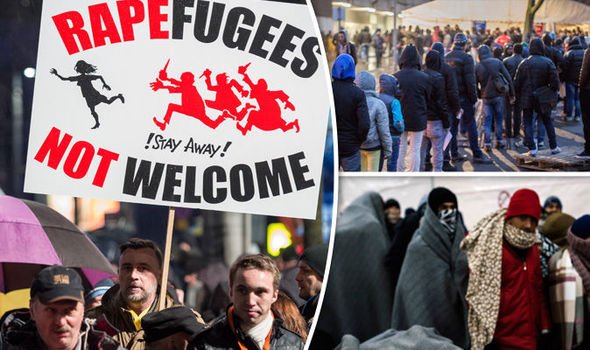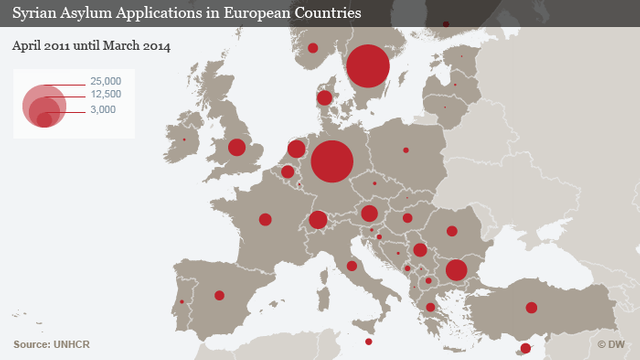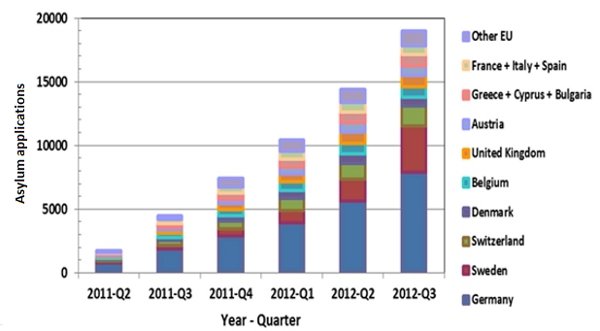Foreign Policy and Security Concerns of the Three European States towards Syrian Refugees
Hey everyone i would like to share a seminar paper by my classmate and i, it is a very interesting topic that is why i decided to share it here.
Abstract
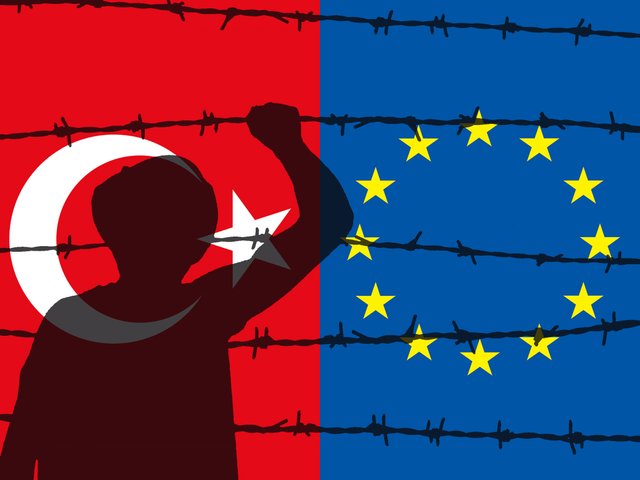
Source
Refugees are people who leave their homes in order to seek safety or refuge. In the present context, one of the most discussed issue about refugee is the Syrian Refugee Crisis. And the European Union as well as the United Nations High Commissioner for Refugees (UNHCR) was trying their most possible ways to solve this world issue by catering each member states of the EU a number of quota to take in refugees. However, no matter how ideal this solution as it be, there are many things to consider prior to the "adoption" of refugees just like making sure that all the states are going to agree and do its responsibilities upon aiding refugees. Given such premise, three leading European states are saying no upon taking refugees to their countries, Hungary, Poland and Czech Republic. These three have its own reasons on rejecting the EU's mandatory relocation quota for refugees. Most of which are their homogenous populations and little experience with multiculturalism, security concerns specifically with the biggest crisis Europe is facing now, terrorism. In retaliation, the European Commission, managing the day-to-day business of the EU launched an infringement procedures against these three member states.
Introduction
United Nations High Commissioner for Refugees is mandated to lead and coordinate international action to protect refugees and resolve refugee problems world-wide. UNHCRs mandate distinguishes it from other humanitarian actors, requiring it to provide international protection to refugees who do not enjoy the protection of their governments. It also recognizes that international cooperation and support are needed to complement the efforts of the host country, which bears the primary responsibility for meeting the needs of refugees.In times of economic difficulty and heightened security concerns, states understandably tend to focus on the well-being of their own populations; but the global challenges of forced displacement call for more, not less, international cooperation and solidarity. In 2017, 66 years since the drafting of the United Nations Convention relating to the Status of Refugees, international refugee policy has stagnated. Since the outbreak of the civil war in Syria in 2011, the global displaced population has sky-rocketed to its highest rate since the Second Word War.
The three so-called durable solutions to the refugee problem --- repatriation, assimilation, and resettlement.
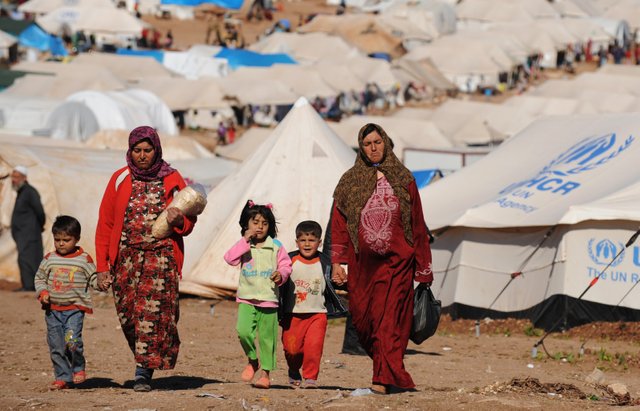
Source
each appear to be beyond the grasp of increasing numbers of displaced people, as conflicts in refugees countries of origin drag on preventing return; countries of first asylum fight local assimilation amid a condition security and economic concerns, which are exacerbated by being made to shoulder more and more responsibility for relief of the displaced; as developed countries close off access to asylum and resettlement.
This results to the number of detentioning refugees that is becoming a more frequent occurrence, as those seeking protection of states other than their own are joined in the public imagination with criminals and terrorist threats, regardless of whether such linkages have any grounding in reality. In the global North this detention tends to take the form of temporary incarceration in a range of different holding-, transit-, processing-, and immigration detention centres and, in some cases, even in formal prisons.
In the global South this detention tends to take the form of enforced encampment, placing refugees under the governance of humanitarian organizations and the United Nations High Commissioner for Refugees (UNHCR). While enforced encampment may be the preferred go-to solution for states in the global South, many refugees seek to self-settle in urban areas, refusing to be encamped and trying to go it alone. The price paid for such agency is often an even more precarious existence than that awaiting refugees within the humanitarian spaces without exit into which hundreds of millions of donor dollars are poured each year, but which seem to provide less protection and opportunity as time passes. Self-settled refugees live in constant risk of arrest, imprisonment, and deportation, since they often lack papers and prior authorisation from state authorities to seek a life outside of the camp archipelago.
Point of Discussion
Refugees from the Syrian civil war are the latest group to join this global population, and they have propelled the refugee problem to the forefront of global politics once more. Since 2015, often driven by a lack of security and opportunity in the countries bordering Syria to which they had initially fled, hundreds of thousands took their fate into their own hands once more and attempted the perilous journey across the Aegean or the Mediterranean to seek new lives in Europe. Suddenly, European press and politics were awash once again with talk about the refugee problem or the refugee crisis. What has been happening now towards this Syrian refugees is that they were unaccepted where they are and unable to return where they came because it's getting worser day by day in the place where they came from.
Moreover, refugees represent two conflicting dimensions of international politics. On the one hand, there is the question of real politik represented by the tensions which refugees create among and between states and other international actors. On the other, refugees represent a fundamental challenge to sovereignty, by forcing international actors to consider ethical principles and issues of fundamental human rights, which are part of their international obligations, over and above the interests of a tidy system of sovereign states. The history of responses to international refugee movements, and the development of legal and organisational norms to shape them, reveals a continuing concern on the part of the international system to codify, order, and make stable a process which is inherently unstable and presumed to be transitory. Resettlement around the world was to be a permanent solution, leading to the naturalisation of the newcomers into their host society.
Repatriation was only mentioned in the Convention in negative terms, that is, states were forbidden to refoule someone to their country of origin. States were to be encouraged to receive refugees on the basis of the economic benefits they would bring: '... once the [main] receiving countries (Australia, New Zealand, North and South America.) were fully convinced of the potential of refugees to fuel their economies (and in the case of the United States, to provide the 2.5 million civilian labour force required by defence-related industries)' others would 'clamour' for them and this would lead to the unprecedented achievement' of a partial economic integration of western economies. The scattering of refugees around the world would also promote, it was argued, a more favourable distribution of population by decongesting Europe and benefitting the under-populated, under-developed 'overseas democracies'. Such population engineering could have been used to strengthen the position of some minority groups, but, regrettably, the planners observed, 'The Union of South Africa with its dangerously small white population had called a halt to immigration.
Statistics and the EU

Source
The Syrian crisis has become the world's worst humanitarian disaster. The EU is the leading donor in the international response to the Syrian crisis, with over 5 billion from the EU and Member States collectively in humanitarian, development, economic and stabilisation assistance. The EU's support goes both to Syrians in their country and to refugees and their host communities in neighbouring Lebanon, Jordan, Turkey and Iraq. In view of the conference Supporting Syria and the Region that will take place in London on 4 February the EU and the Member States are working on further support, both short and medium term. In 2011, the EU responded to the unacceptable violence used by the military and security forces against peaceful protestors by suspending its cooperation with the Syrian Government under the European Neighbourhood Policy and gradually extending restrictive measures. This policy sought to pressure the Syrian Government into ending violence and to encourage a political solution to the conflict. From the very outset, the EU has condemned human rights violations in Syria in the strongest terms. EU's objective is to bring an end to the conflict and enable the Syrian people to live in peace in their own country. The latest EU position is stated in the Foreign Affairs Council Conclusions of 12 October 2015.
The EU is a full member and active participant in the International Syria Support Group. It fully supports the UN-led process, notably the efforts of the UN Special Envoy for Syria. Only a Syrian-led political process leading to a peaceful and inclusive transition, based on the principles of the Geneva communiqué of 30 June 2012 and in line with relevant UN Security Council resolutions (notably 2254 (2015), will bring back stability to Syria. The European Commission's support in response to the Syrian crisis has exceeded 2.6 billion. The Commission provides both immediate humanitarian assistance, and non-humanitarian aid, responding to medium term needs. In humanitarian assistance, the Commission has so far provided 1.037 billion for life-saving emergency responses, food, water, sanitation, hygiene and shelter to millions of Syrians inside Syria and in neighbouring countries.
In non-humanitarian aid, the Commission has mobilised 1.6 billion, including: 961 million through the European Neighbourhood Instrument (ENI)- of which 381 million channelled via the EU Regional Trust Fund in response to the Syrian crisis (EUTF)-to address the medium term needs of the Syrian refugees living in Syria, Lebanon and Jordan (education, livelihoods, health, access to basic services); 180 million through Macro-financial Assistance (MFA) to Jordan to assist with the influx of Syrian refugees; 180 million through the Instrument contributing to Stability and Peace for assistance programmes in opposition controlled areas in Syria, mediation efforts, transitional justice preparation and measures to reduce tensions between refugees and host communities in the region, as well as to support the destruction of Syrian chemical stockpiles and chemical threat prevention; 249 million through the Instrument for Pre-Accession Assistance (IPA) to Turkey - of which 173 million are channelled via the EUTF; 26 million through the European Instrument for Democracy and Human Rights; 26 million through the Development Co-operation Instrument (DCI)- of which 10 million are channelled via the EUTF.
While the EU has this helping hand to the refugees and has lay down an assurance that the host country of the refugees will not have to worry for they will give a hands-on assistance there are still some of its members that has been aloof or rejecting EU on catering numbers of refugees each country member. And the following three countries are the leading one on taking no refugees in their sovereignty: Poland, Hungary, and Czech Republic.Seemingly unfazed by the recent European Commission proposal to punish countries which refuse to comply with "fair" refugee allocation quotas with fines as high as [euro]250,000 per asylum seeker, the head of Poland's ruling Law and Justice party and former PM Jaroslaw Kaczynski said that no refugees will be accepted in Poland as they pose a threat to security adding that Poland will oppose any law forcing EU members to pay [euro]250,000 per refused refugee. In addition to what he said, he stated that "After recent events connected with acts of terror [Poland] will not accept refugees because there is no mechanism that would ensure security." Needless to say, Poland is also vocally opposed to the above mentioned proposal, which would force EU member states to pay [euro]250,000 per refused refugee. The common complaint voiced not only by Poland, but all Eastern European nations who would suffer the most from Europe's aggressive refugee reallocation proposal. Although the goal of the EC is to redistribute the weight of the refugee crisis from countries such as Greece by introducing automatic asylum quotas for each EU member state.5 But this redistribution was seen as a threat to the security. To them, taking refugees in is like putting a ticking bomb under them and before it will explode, they were defusing that bomb beforehand. Because they have this mindset that Muslim migrants could be a problem for Polands homogenous society.
In Hungary, facts have been dispensed with towards rejecting refugee resettlement, allege critics and the government's language has been so abrasive about asylum seekers, who have been portrayed as being synonymous with terrorists and criminals. Mr Orban, leader of the right-wing populist Fidesz party and a supporter of Donald Trump, has already ordered the reinforcement of fences along Hungarys southern border to make sure that there are no longer refugees that would try to sneak across the border and anyone trying to sneak through would face jail. Thus detaining refugees creates another issue in Hungarian government for accoedingly, they are stepping refugees right's. Also, they claimed that refugees are a threat to Europes Christian identity and culture.
The inflammatory way that officials and the national media in Hungary describe the current influx of refugees creates confusion, hostility, and fear among their citizenry. This discourse has only exacerbated the xenophobia deeply entrenched in a part of the Hungarian population, and made the efforts of ordinary citizens and organizations working with asylum seekers and migrants more difficult.
Whilst for the Czech Republic, Czech Prime Minister Bohuslav Sobotka reiterated the country's attitude of rejecting the European Union (EU)-proposed compulsory quotas for the immigrants. He said the Czech Republic wants to help refugees on the basis of sovereign government decisions, not on the mechanisms defined by the EU. Sobotka said his country was defending the principles of common sense. He believes that the adoption of quotas could encourage migration pressures towards Europe. Sobotka stressed that the Czech Republic wants to provide help on a voluntary basis and in accordance with its capabilities and capacities. In addition, following terrorist attacks in Manchester and London, Czech interior minister Milan Chovanec announced that due to the aggravated security situation and the dysfunctionality of the whole relocationsystem, the government approved a proposal to halt the system for the Czech Republic.
Analysis
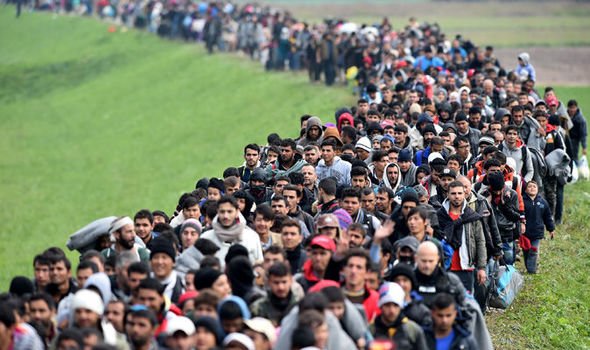
Source
Many people are forced to flee their homes to destinations that are insecure, to urban areas, to countries where access to asylum is restricted, and to distant new destinations. Unsure of what may possibly the reactions of that "destination". For many refugees, returning home is their eventual goal, but only when the government has changed or when the violence has ended and the question is when? or will it ever be? Voluntary repatriation is the ideal, but is not always possible. Unfortunately, some countries refuse to allow refugees to enter and receive protection or the countries only allow refugees to stay a short time and then forcibly repatriate them, often placing refugees in the same dangerous situations that they fled in the first place. Civil society organizations, communities and individuals often make the most meaningful contributions to improving the state of the worlds refugees.
But the above mention eastern European countries although they have their own reasons as to why they can no longer cater or generally rejected migrants/assylums/refugees into their sovereignty and obviously it is because of the security concerns if they will risk to accept more and more, condemnation and legal cases against them is inevitable. More specially that "European countries' " first impression among others are somewhat relative to them having a majority of Christianity as its religion. Because accordingly, a good Christian will help and aid the needy ones. But such states refuse refugees for economic, cultural, and political reasons. Given such actions they know what it will takes for them on saying no to refugeed. Legal infringement procedures is what they are going to face.
This existing crisis leads to another case to solve on how to convinced or let such states to accept numbers of refugees, again for consideration and for goodness sake.
Thank you for reading!
Bibliography
Books
Haddad, Emma. The Refugee in International Society: Between Sovereigns. Cambridge: Cambridge University Press, 2008.
Harrell-Bond, Barbara. Refugees and the International System: The Evolution of Solutions. New York: Refugee Studies Centre, 1995.
Kumin, Judith. The State of the World's Refugees: In Search of Solidarity. Switzerland: The UN Refugee Agency, 2012.
Saunders, Natasha. International Political Theory and the Refugee Problem. New York: Routledge, 2018.
Wang, Megan. The Middle East in London. United Kingdom: London Middle East Institute, 2016.
Journals
"Czech Republic Rejects EU Proposed Quotas for Refugees." 2015.Xinhua News Agency - CEIS, May 13. https://search.proquest.com/docview/1680713785?accountid=141440.
"European Union/Syria: EU Support in Response to the Syrian Crisis." 2016.Asia News Monitor, Feb 04. https://search.proquest.com/docview/1762187794?accountid=141440.
"Hungary/European Union: Hungary to Reject Refugee Resettlement, Adding to EU's Post-Brexit Woes." 2016.AsiaNews Monitor, Sep 29. https://search.proquest.com/docview/1823915909?accountid=141440.
"Phil's Stock World: Poland Refuses to Accept any Refugees "as they Pose A Threat to Security", Will Not Comply with European "Blackmail" 2016. Chatham: Newstex. https://search.proquest.com/docview/1787545787?accountid=141440.

